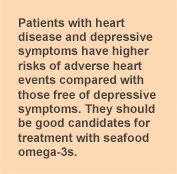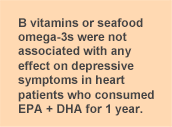
There have been several encouraging studies reporting improved symptoms in depressive illness among those who consumed long-chain (seafood) omega-3s. Other research has observed lower levels of these fatty acids in patients with heart disease and/or depressive illness. The benefits to heart health of increased consumption of these fatty acids, especially among survivors of a heart attack, suggest that higher intakes of these substances might improve both conditions in heart patients who develop depressive symptoms. Thus, increasing the consumption of seafood omega-3s in heart patients with depressive illness appears an obvious intervention to evaluate.

It is also known that heart patients with depressive illness face a higher risk of adverse heart events and mortality than similar patients without depressive symptoms. In addition, individuals with both conditions and higher levels of seafood omega-3s in their blood survived longer than those whose omega-3 levels were low. This information provided the rationale for a controlled study of patients with several types of heart disease or stroke and varying degrees of depressive symptoms who were supplemented with B vitamins or EPA + DHA or both for 1 year. Participants were 61 years of age on average and were monitored for approximately 5 years.

At follow-up, 31% of participants experienced some symptoms of depressive illness, with nearly 7% experiencing moderate to severe symptoms. Neither the consumption of B vitamins nor EPA + DHA was associated with these observations. Interestingly, when the investigators examined the results according to the sex of the participant, they noted that men taking the omega-3 supplements were more likely to develop depressive symptoms, but women were less likely to do so. The observation in men was unexpected and the investigators had no explanation for it. Also, this finding is not supported by previous studies and would need additional confirmation to be considered a likely outcome. Given that the dose of EPA + DHA consumed in this study was well below the level associated with improved symptoms in depressive illness, the analyses tell us little about the potential usefulness of seafood omega-3s in heart patients with depressive symptoms.
 There have been several encouraging studies reporting improved symptoms in depressive illness among those who consumed long-chain (seafood) omega-3s. Other research has observed lower levels of these fatty acids in patients with heart disease and/or depressive illness. The benefits to heart health of increased consumption of these fatty acids, especially among survivors of a heart attack, suggest that higher intakes of these substances might improve both conditions in heart patients who develop depressive symptoms. Thus, increasing the consumption of seafood omega-3s in heart patients with depressive illness appears an obvious intervention to evaluate.
There have been several encouraging studies reporting improved symptoms in depressive illness among those who consumed long-chain (seafood) omega-3s. Other research has observed lower levels of these fatty acids in patients with heart disease and/or depressive illness. The benefits to heart health of increased consumption of these fatty acids, especially among survivors of a heart attack, suggest that higher intakes of these substances might improve both conditions in heart patients who develop depressive symptoms. Thus, increasing the consumption of seafood omega-3s in heart patients with depressive illness appears an obvious intervention to evaluate.  It is also known that heart patients with depressive illness face a higher risk of adverse heart events and mortality than similar patients without depressive symptoms. In addition, individuals with both conditions and higher levels of seafood omega-3s in their blood survived longer than those whose omega-3 levels were low. This information provided the rationale for a controlled study of patients with several types of heart disease or stroke and varying degrees of depressive symptoms who were supplemented with B vitamins or EPA + DHA or both for 1 year. Participants were 61 years of age on average and were monitored for approximately 5 years.
It is also known that heart patients with depressive illness face a higher risk of adverse heart events and mortality than similar patients without depressive symptoms. In addition, individuals with both conditions and higher levels of seafood omega-3s in their blood survived longer than those whose omega-3 levels were low. This information provided the rationale for a controlled study of patients with several types of heart disease or stroke and varying degrees of depressive symptoms who were supplemented with B vitamins or EPA + DHA or both for 1 year. Participants were 61 years of age on average and were monitored for approximately 5 years.  At follow-up, 31% of participants experienced some symptoms of depressive illness, with nearly 7% experiencing moderate to severe symptoms. Neither the consumption of B vitamins nor EPA + DHA was associated with these observations. Interestingly, when the investigators examined the results according to the sex of the participant, they noted that men taking the omega-3 supplements were more likely to develop depressive symptoms, but women were less likely to do so. The observation in men was unexpected and the investigators had no explanation for it. Also, this finding is not supported by previous studies and would need additional confirmation to be considered a likely outcome. Given that the dose of EPA + DHA consumed in this study was well below the level associated with improved symptoms in depressive illness, the analyses tell us little about the potential usefulness of seafood omega-3s in heart patients with depressive symptoms.
At follow-up, 31% of participants experienced some symptoms of depressive illness, with nearly 7% experiencing moderate to severe symptoms. Neither the consumption of B vitamins nor EPA + DHA was associated with these observations. Interestingly, when the investigators examined the results according to the sex of the participant, they noted that men taking the omega-3 supplements were more likely to develop depressive symptoms, but women were less likely to do so. The observation in men was unexpected and the investigators had no explanation for it. Also, this finding is not supported by previous studies and would need additional confirmation to be considered a likely outcome. Given that the dose of EPA + DHA consumed in this study was well below the level associated with improved symptoms in depressive illness, the analyses tell us little about the potential usefulness of seafood omega-3s in heart patients with depressive symptoms.

